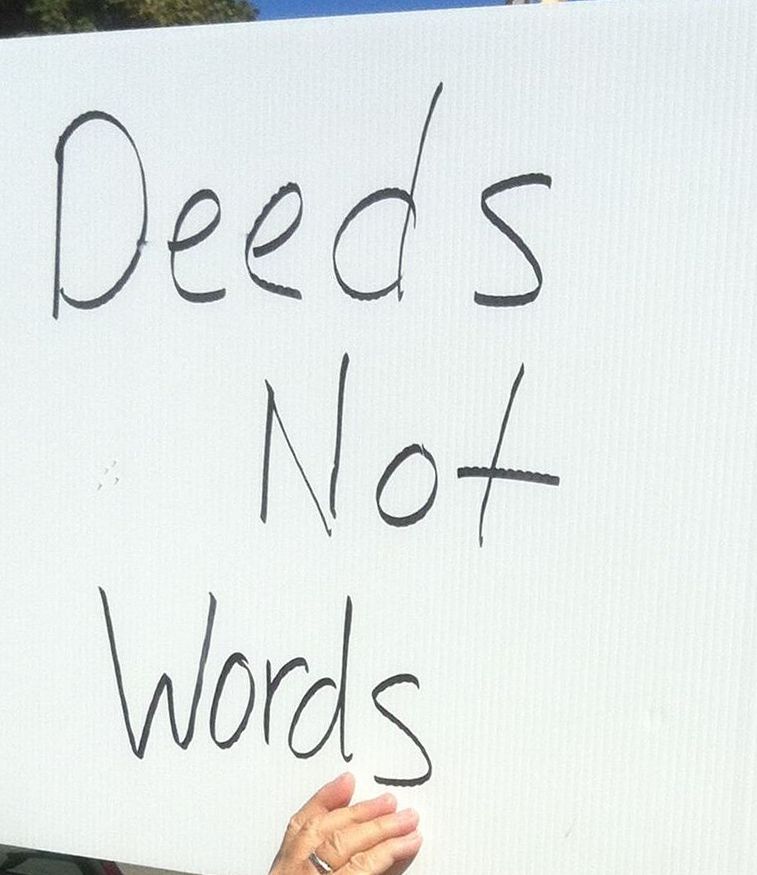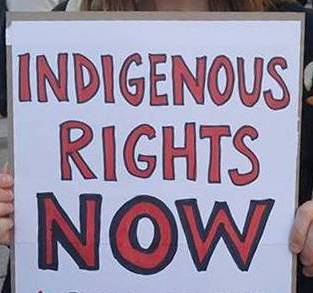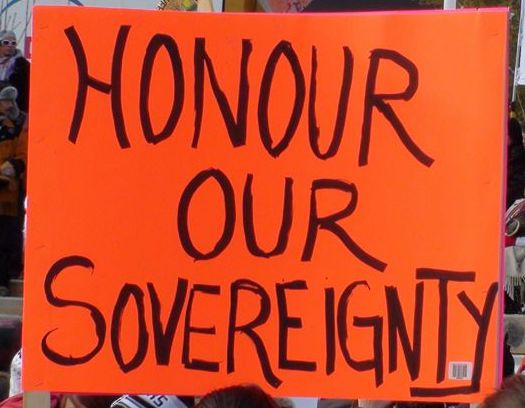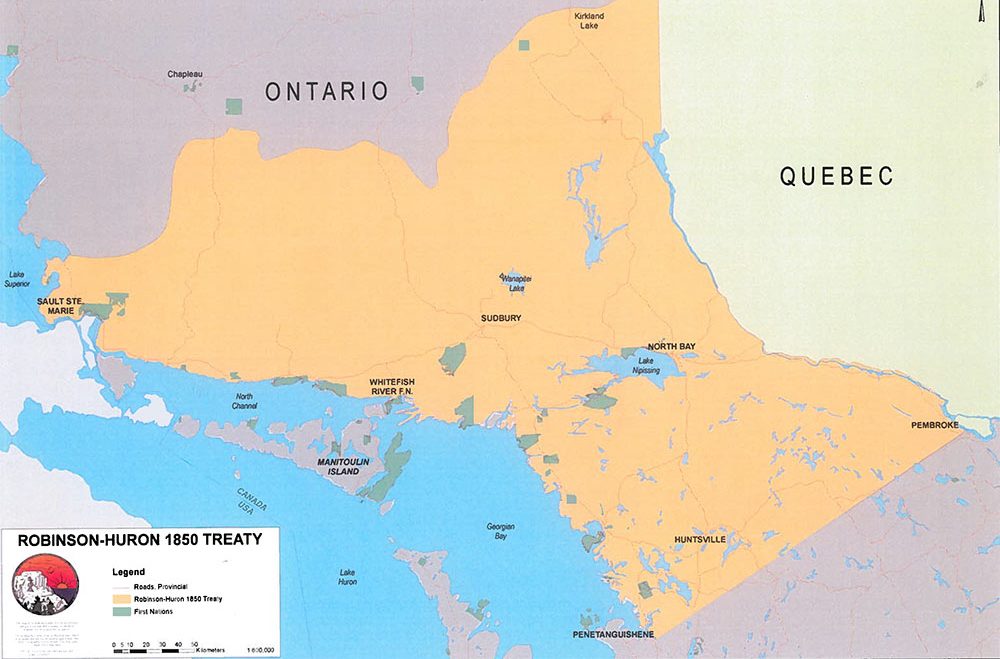|
March 3, 2018 - No. 8
Supplement
Robinson Treaty
with Ojibewa of
Lake Huron Conveying Certain Lands
to the Crown
PDF
 
• Open
Letter to Carolyn Bennett,
Minister of Indigenous and Northern Affairs
- Ogimaa Duke Peltier and
Ogimaa Dean Sayers -
• Text of 1850
Robinson Huron Treaty
Robinson Treaty with
Ojibewa of
Lake Huron
Conveying Certain Lands to the Crown
Open Letter to Carolyn Bennett,
Minister of Indigenous
and
Northern Affairs
- Ogimaa Duke Peltier and Ogimaa Dean
Sayers -
Dear Minister Bennett:
This is a response to your letter dated July 24, 2017,
which
is a response to our letter to Prime Minister Trudeau dated
August 21, 2016, regarding the Robinson Huron Treaty Annuities
Claim.
We are writing to express, in good faith but in no
uncertain
terms, our profound disappointment regarding the clear and
complete disconnect between your government's enlightened words
and hopeful statements and the actions of your government in
dealing with our Claim. Your letter says: "The Government of
Canada places a high priority on renewing a nation-to-nation
relationship with Indigenous Peoples. We are committed to
developing a partnership based on recognition of rights, respect
and cooperation." Yet, by its actions, your government is doing
the exact opposite!
We wrote to the Prime Minister on Aug. 21 in the hopes
that
your government's stated commitment to reconciliation would
provide us with an opportunity to resolve our claim through
negotiation rather than litigation. Unfortunately, not only have
your officials rejected our overtures at reconciliation, your
lawyers are advancing arguments and evidence in the litigation
that can only be described as outdated, obsolete, ethnocentric,
adversarial and inflammatory. Needless to say, they reflect
attitudes that are contrary to the Truth and Reconciliation
Commission Report and the UN Declaration on the Rights of
Indigenous Peoples.
We will provide you with just a few of the most
egregious
examples. Canada's Expert, Professor Alexander von Gernet, states
in his Report:
I believe it is safe for me
to express (a rare)
certainty
that no Anishinaabe person living today would bring a ball-headed
war club with attached American scalp-locks to a meeting with the
Governor General, as happened when Shingwaukonse's delegation met
Lord Elgin in Montreal in July of 1849. And it is probably just
as safe to say that our current Governor General has never
publically referred to Indigenous people as "children," as was
the common practice for centuries. These were different times,
and cultural norms change. This may seem self-evident, but it
bears repeating.
Dr. Stark's description of
Anishinaabe "law,"
"jurisprudence," "legal principles," and philosophies is very
interesting, but it is in large part a construction of late
twentieth and early twenty-first-century academics who have
generated a burgeoning literature that is as sophisticated in its
discourse as it is disconnected from everyday practical
realities.
Even if it is partly derived
from the wisdom of Elders
and
their oral traditions, uncritically projecting such a modern
academic construct back in time for the purpose of illuminating
what motivated the actions of past peoples or reconstructing what
they would or might have thought or expected is problematic, for
it must carry an assumption of continuity that needs to be
balanced against evidence for change.
Another of Canada's Experts, Professor Alain Beaulieu,
seeks
to undermine the significance of the Treaty negotiated at Niagara
in 1764, and characterizes the Indian Nations that attended the
Niagara Treaty Council as supplicants fearful of British reprisal
rather than nations of equals. He also downplays the significance
of the Royal Proclamation of 1763 and the role it played at the
Niagara Treaty Council. Professor Beaulieu's opinion is backed-up
by another of Canada's experts, Professor Paul McHugh, who argues
in his Expert report that the Royal Proclamation of 1763 has no
legal effect.
Your lawyers will argue that these are the independent
opinions of experts. However, their ethnocentric opinions are
being tendered as evidence on behalf of your government. And, in
the case of Professor Beaulieu, for example, his opinion appears
to be mandated by the terms of his engagement, by the federal
Department of Justice, which calls the Niagara Treaty "the
so-called Treaty of Niagara."
The landmark importance of this Treaty and the
connection
with the Royal Proclamation has been carefully set out by the
Ontario Court of Appeal in the decision, Chippewas of Sarnia Band
v. Canada (2000). The refusal of your government to accept and
embrace judicial rulings such as the Chippewas of Sarnia case
only promotes conflict rather than reconciliation.
Your letter refers to without prejudice exploratory
discussions which you had previously proposed in your letter of
July 22, 2016. You say that your "Government is open to
constructive dialogue" and that you "look forward to the results
of these discussions." It is surprising that your officials would
not have reported the failed results of those "exploratory
discussions".
Minister Bennett, we had a meeting on Dec. 22, 2016 --
seven
months before your letter of July 24, 2017 -- and the meeting was
far from a "constructive dialogue". We were certainly prepared to
be constructive; but your officials were not. Indeed, on Mar. 14,
2017, Mr. Gary Penner of the Department of Justice wrote:
Canada's position, as
expressed at the meeting, is that
it
does not and will not have a mandate to enter into negotiations
predicated upon the Plaintiffs' interpretation of the
Robinson-Huron Treaty.
In other words, Canada's position is that if we do not
accept
Canada's interpretation of the treaty, then it is not prepared to
enter into any negotiations. Canada was built on treaties. If
Canada cannot commit to constructive engagement with respect to
treaty interpretation and implementation, the goal of
reconciliation is in a word, doomed.
In refusing to negotiate, Canada resorts to the age-old
tactic of passing the buck to the province. Mr. Penner's letter
continues:
Ontario's position, as
understood from the December
22nd
meeting, is that the province is willing to contemplate indexing
the annuities, but to date has given no indication that it has a
mandate to consider revenue sharing.
Given that the Plaintiffs'
mandate is limited to
settling
this litigation on the basis of treaty annuities interpretation
and revenue-sharing, Canada believes that negotiations can only
advance if Ontario has a mandate to negotiate revenue-sharing or
if the Plaintiffs have a willingness to explore other settlement
options. Absent this, and in light of the current limits of the
Plaintiffs' mandate, there does not appear to be any basis to
enter negotiations.
 Canada ought to be taking
the lead in bringing Ontario to the
table. Instead, it is Ontario that has expressed a willingness to
negotiate from the beginning. I might also say that Ontario's
expert reports are not nearly as adversarial and ethnocentric as
Canada's. In our view, "the Crown" owes the Robinson Huron Treaty
Anishinaabek the duty to act honourably in interpreting and
implementing our Treaty. This includes both Ontario and Canada,
and both governments ought to decide how that responsibility
should be discharged. Canada ought to be taking
the lead in bringing Ontario to the
table. Instead, it is Ontario that has expressed a willingness to
negotiate from the beginning. I might also say that Ontario's
expert reports are not nearly as adversarial and ethnocentric as
Canada's. In our view, "the Crown" owes the Robinson Huron Treaty
Anishinaabek the duty to act honourably in interpreting and
implementing our Treaty. This includes both Ontario and Canada,
and both governments ought to decide how that responsibility
should be discharged.
Canada should be taking the lead in promoting
reconciliation,
instead of shirking its responsibility just because Ontario
refuses to negotiate on certain terms. This is consistent with
the mandate letters issued to you and your cabinet colleague
Justice Minister Jody Wilson-Raybould. Those letters identified
the need for renewal of the relationship between Canada and
Indigenous Peoples, including major adjustments to the laws,
policies and operational practices applied to Indigenous
Peoples.
According to the mandate letters, this renewal must be
a
nation-to-nation relationship, based on recognition, rights,
respect, co-operation, and partnership. Moreover, Minister of
Justice and the Attorney General Jody Wilson-Raybould was
mandated to review Canada's litigation strategy to abandon
positions that are not consistent with the Government of Canada's
commitments, the Constitution Act,
1982 and the UN Declaration on
the Rights of Indigenous Peoples.
Your announcement of Canada's support for the UN
Declaration
on the Rights of Indigenous Peoples at the United Nations
Permanent Forum on Indigenous Issues on May 10, 2016, in New York
City was clear:
We intend nothing less than
to adopt and implement the
declaration in accordance with the Canadian Constitution. Canada
is in a unique position to move forward.
In fact, through Section 35
of its Constitution, Canada
has a
robust framework for the protection of indigenous rights. Section
35 of our Constitution states, "the existing Aboriginal and
treaty rights of Aboriginal peoples of Canada are hereby
recognized and affirmed." Indigenous people, including Grand
Chief John, and so many others fought hard to include these
rights in our Constitution.
By adopting and implementing
the Declaration, we are
excited
that we are breathing life into Section 35 and recognizing it now
as a full box of rights for Indigenous peoples in Canada. Canada
believes that our constitutional obligations serve to fulfil all
of the principles of the declaration, including "free, prior and
informed consent."
As declared in the R.
v.
Sparrow case, the Supreme
Court of
Canada established that the recognition and affirmation of treaty
and Aboriginal rights through section 35 of the Constitution Act,
1982, produced a significant transformation for Indigenous
Peoples:
... this (s.35) is not just
a codification of the case
law on
aboriginal rights that had accumulated by 1982. Section 35 calls
for a just settlement with aboriginal peoples. It renounces the
old rules of the game under which the Crown established courts of
law and denied those courts the authority to question sovereign
claims by the Crown.
Over the past thirty plus years, the Supreme Court of
Canada
and other Appellate Courts have been showing some remarkable
leadership in seeking to understand the aspirations, perspectives
and expectations of Indigenous Peoples and in giving effect
thereto through case law like Taylor
and Williams, Sparrow,
Marshall, Chippewas of Sarnia, Delgamuukw, Haida, Mikisew Cree
and Tsilhqot'in Nation.
In cases like those above-noted, the Courts use
language
which encourages less rigidity in discussing and finding
solutions for the conflict between Crown law and policy and
Aboriginal and treaty rights.
 The less rigid approach
means not seeking to explain how
Aboriginal and treaty rights fit into the existing paradigms such
as extinguishment, but rather, how unique these rights are and
that the common and constitutional law are flexible enough to
accommodate such challenges. The Court refers to it as the
challenge of reconciling pre-existing Aboriginal rights and
treaty rights with Crown sovereignty. The Courts have also
expressed the view that Aboriginal perspectives need to be given
equal weight. The less rigid approach
means not seeking to explain how
Aboriginal and treaty rights fit into the existing paradigms such
as extinguishment, but rather, how unique these rights are and
that the common and constitutional law are flexible enough to
accommodate such challenges. The Court refers to it as the
challenge of reconciling pre-existing Aboriginal rights and
treaty rights with Crown sovereignty. The Courts have also
expressed the view that Aboriginal perspectives need to be given
equal weight.
A positive outlook on the Court's approach would be to
describe their carefully crafted judgments as encouraging a
principled approach in determining what is "justice" in the
circumstances. Language in the judgments suggestive of the
principled approach is reflected in Canada's recently announced
Principles which speak of reconciliation, the honour of the
Crown, respecting and implementing rights and the fundamental
purpose of section 35 of the Constitution
Act, 1982. In
particular, Principles 5 and 9 state:
5. The Government of Canada
recognizes that treaties,
agreements and other constructive arrangements between Indigenous
peoples and the Crown have been and are intended to be acts of
reconciliation based on mutual recognition and respect.
9. The Government of Canada
recognizes that
reconciliation is
an ongoing process that occurs in the context of evolving
Indigenous-Crown relationships.
Yet, the approach of your government in the Robinson
Huron
Treaty litigation is the complete opposite of your government's
stated intentions. And, while some disputes might benefit from
judicial interventions to advance reconciliation, the adversarial
and ethnocentric arguments and approach being advanced in this
litigation are counter-productive.
We can only hope that your words and Canada's
announcement of
its Principles Respecting the Government of Canada's Relationship
with Indigenous Peoples and the need for a new litigation
strategy will combine to cause Canada to negotiate, rather than
to litigate, a resolution of our treaty annuities claim. Only in
this way can reconciliation truly be reached.
Sincerely,
Ogimaa Duke Peltier and Ogimaa Dean Sayers Robinson
Huron
Treaty Trust Fund

Text of 1850 Robinson Huron Treaty

Territory covered by Robinson-Huron Treaty. Click to enlarge.
Reprinted from the edition of 1939 by
ROGER DUHAMEL, F.R.S.C.
QUEEN'S PRINTED AND CONTROLLER OF STATIONERY
OTTAWA, 1964
Cat. No. Ci 72-1264
THIS AGREEMENT , made and
entered into
this ninth day of September, in the year of our Lord one thousand
eight hundred and fifty, at Sault Ste. Marie, in the Province of
Canada, between the Honorable WILLIAM BENJAMIN ROBINSON, of the
one part, on behalf of HER MAJESTY THE QUEEN, and
SHINGUACOUSE NEBENAIGOCHING, KEOKOUSE,
MISHEQUONGA,
TAGAWININI, SHABOKISHICK, DOKIS, PONEKEOSH, WINDAWTEGOWININI,
SHAWENAKESHICK, NAMASSIN, NAOQUAGABO, WWBEKEKIK, KITCHEPOSSIGYN by
PAPASAINSE, WAGEMAKI, PAMEQUONAISHEUG, Chiefs;
and John Bell, PAQWATCHININI, MASHEKYASH, IDOWEKESIS,
WAQUACOMICK, OCHEEK, METIGOMIN, WATACHEWANA, MINWAPAPENASSE,
SHENAOQUOM, ONINGEGUN, PANAISSY, PAPASAINSE, ASHEWASEGA,
KAGESHEWAWETUNG, SHAWONEBIN; and also chief MAISQUASO ( also
Chiefs MUCKATA, MISHOQUET, and MEKIS), and
MISHOQUETTO and ASA WASWANAY and
PAWISS, principal men of the OJIBEWA INDIANS, inhabiting
and claiming the Eastern and Northern Shores
of
Lake Huron, from Penetanguishine to Sault Ste. Maire, and thence
to Batchewanaung Bay, on the Northern Shore of Lake Superior;
together with the Islands in the said Lakes, opposite to the
Shores thereof, and inland to the Height of land which separates
the Territory covered by the charter of the Honorable Hudson Bay
Company from Canada; as well as all unconceded lands within the
limits of Canada West to which they have any just claim, of the
other part, witnesseth:
THAT for, and in consideration of the sum of two
thousand
pounds of good and lawful money of Upper Canda, to them in hand
paid, and for the further perpetual annuity of six hundred pounds
of like money, the same to be paid and delivered to the said
Chiefs and their Tribes at a convenient season of each year, of
which due notice will be given, at such places as may be
appointed for that purpose, they the said Chiefs and Principal
men, on behalf of their respective Tribes or Bands, do hereby
fully, freely, and voluntarily surrender, cede, grant, and convey
unto Her Majesty, her heirs and successors for ever, all their
right, title, and interest to, and in the whole of, the territory
above described, save and except the reservations set forth in
the schedule hereunto annexed; which reservations shall be held
and occupied by the said Chiefs and their Tribes in common, for
their own use and benefit.
And should the said Chiefs and their respective Tribes
at any
time desire to dispose of any part of such reservations, or of
any mineral or other valuable productions thereon, the same will
be sold or leased at their request by the Superintendent-General
of Indian Affairs for the time being, or other officer having
authority so to do, for their sole benefit, and to the best
advantage.
And the said William Benjamin Robinson of the first
part, on
behalf of Her Majesty and the Government of this Province, hereby
promises and agrees to make, or cause to be made, the payments as
before mentioned; and further to allow the said Chiefs and their
Tribes the full and free privilege to hunt over the Territory now
ceded by them, and to fish in the waters thereof, as they have
heretofore been in the habit of doing; saving and excepting such
portions of the said Territory as may from time to time be sold
or leased to individuals or companies of individuals, and
occupied by them with the consent of the Provincial
Government.
The parties of the second part further promise and
agree that
they will not sell, lease, or otherwise dispose of any portion of
their Reservations without the consent of the
Superintendent-General of Indian Affairs, or other officer of
like authority, being first had and obtained. Nor will they at
any time hinder or prevent persons from exploring or searching
for minerals, or other valuable productions, in any part of the
Territory hereby ceded to Her Majesty, as before mentioned. The
parties of the second part also agree, that in case the
Government of this Province should before the date of this
agreement have sold, or bargained to sell, any mining locations,
or other property, on the portions of the Territory hereby
reserved for their use; then and in that case such sale, or
promise of sale, shall be perfected by the Government, if the
parties claiming it shall have fulfilled all the conditions upon
which such locations were made, and the amount accruing therefrom
shall be paid to the Tribe to whom the Reservation belongs.
The said William Benjamin Robinson, on behalf of Her
Majesty,
who desires to deal liberally and justly with all her subjects,
further promises and agrees, that should the Territory hereby
ceded by the parties of the second part at any future period
produce such an amount as will enable the Government of this
Province, without incurring loss, to increase the annuity hereby
secured to them, then and in that case the same shall be
augmented from time to time, provided that the amount paid to
each individual shall not exceed the sum of one pound Provincial
Currency in any one year, or such further sum as Her Majesty may
be graciously pleased to order; and provided further that the
number of Indians entitled to the benefit of this treaty shall
amount to two-thirds of their present number, which is fourteen
hundred and twenty-two, to entitle them to claim the full benefit
thereof. And should they not at any future period amount to
two-thirds of fourteen hundred and twenty-two, then the said
annuity shall be diminished in proportion to their actual
numbers.
The said William Benjamin Robinson of the first part
further
agrees, on the part of Her Majesty and the Government of this
Province, that in consequence of the Indians inhabiting French
River and Lake Nipissing having become parties to this treaty,
the further sum of one hundred and sixty pounds Provincial
Currency shall be paid in addition to the two thousand pounds
above mentioned.
Schedule of Reservations
made by the above-named
subscribing Chiefs and Principal Men.
FIRST -- Pamequonaishcung and his Band, a tract of land
to
commence seven miles, from the mouth of the River Maganetawang,
and extending six miles east and west by three miles north.
SECOND -- Wagemake and his Band, a tract of land to
commence
at a place called Nekickshegeshing, six miles from east to west,
by three miles in depth.
THIRD -- Kitcheposkissegan (by Papasainse), from Point
Grondine
westward, six miles inland, by two miles in front, so as to
include the small Lake Nessinassung a tract for themselves and
their Bands.
FOURTH -- Wabakekik, three miles front, near
Shebawenaning,
by five miles inland, for himself and Band.
FIFTH -- Namassin and Naoquagabo and their Bands, a
tract of
land commencing near Qacloche, at the Hudson Bay Company's
boundary; thence westerly to the mouth of Spanish River; then
four miles up the south bank of said river, and across to the
place of beginning.
SIXTH -- Shawenakishick and his Band, a tract of land
now
occupied by them, and contained between two rivers, called
Whitefish River, and Wanabitaseke, seven miles inland.
SEVENTH -- Windawtegawinini and his Band, the Peninsula
east
of Serpent River, and formed by it, now occupied by them.
EIGHTH -- Ponekeosh and his Band, the land contained
between
the River Mississaga and the River Penebewabecong, up to the
first rapids.
NINTH -- Dokis and his Band, three miles square at
Wanabeyakokaun, near Lake Nipissing and the island near the Fall
of Okickandawt.
TENTH -- Shabokishick and his Band, from their present
planting grounds on Lake Nipissing to the Hudson Bay Company's
post, six miles in depth.
ELEVENTH -- Tagawinini and his Band, two miles square
at
Wanabitibing, a place about forty miles inland, near Lake
Nipissing.
TWELFH -- Keokouse and his Band, four miles front from
Thessalon River eastward, by four miles inland.
THIRTEENTH -- Mishequanga and his Band, two miles on
the lake
shore east and west of Ogawaminang, by one mile inland.
FOURTEENTH -- For Shinguacouse and his Band, a tract of
land
extending from Maskinongé Bay, inclusive, to Partridge
Point, above Garden River on the front, and inland ten miles,
throughout the whole distance; and also Squirrel Island.
FIFTEENTH -- For Nebenaigoching and his Band, a tract
of land
extending from Wanabekineyunnung west of Gros Cap to the boundary
of the lands ceded by the Chiefs of Lake Superior, and inland ten
miles throughout the whole distance, including Batchewanaung Bay;
and also the small island at Sault Ste. Marie used by them as a
fishing station.
SIXTEENTH -- For Chief Mekis and his Band, residing at
Wasaquesing (Sandy Island), a tract of land at a place on the
main shore opposite the Island; being the place now occupied by
them for residence and cultivation, four miles square.
SEVENTEENTH -- For Chief Muckatamishaquet and his Band,
a
tract of land on the east side of the River Naishconteong, near
Pointe aux Barils, three miles square; and also a small tract in
Washauwenega Bay -- now occupied by a part of the Band -- three
miles square.
Signed, sealed, and delivered at Sault Ste. Marie, the
day and year first above written, in presence of:
(Signed)
Astley P. Cooper, Capt. Rifle Brig.
George Ironside, S. I. Affairs.
F. W. Balfour, Lieul. Rifle Brig.
Allan MacDonnell.
Geo. Johnston, Interpreter.
Louis Cadott.
J. B. Assikinack.
T. W. Keating.
Joe. Wilson.
(Signed)
W. B. Robison. Shinguaconse, his + mark. [L. S.]
Nebenaigoching. his + mark. [L. S.]
Keokunse, his + mark. [L. S.]
Mishequonga, his + mark. [L. S.]
Tagawinini, his + mark. [L. S.]
Shabakeshick, his + mark. [L. S.]
Dokis, his + mark. [L. S.]
Ponekeosh, his + mark. [L. S.]
Windawegowinini, his + mark. [L. S.]
Shawanakeshick, his + mark. [L. S.]
Namassin, his + mark. [L. S.]
Muckata Mishaquet, his + mark. [L. S.]
Mekis, his + mark. [L. S.]
Maisquaso, his + mark. [L. S.]
Naoquagaho, his + mark. [L. S.]
Warokekick, his + mark. [L. S.]
Kithepossegun, (by Papasainse) his + mark. [L. S.]
Wagemake, his + mark. [L. S.]

PREVIOUS
ISSUES | HOME
Website: www.cpcml.ca
Email: editor@cpcml.ca
|

